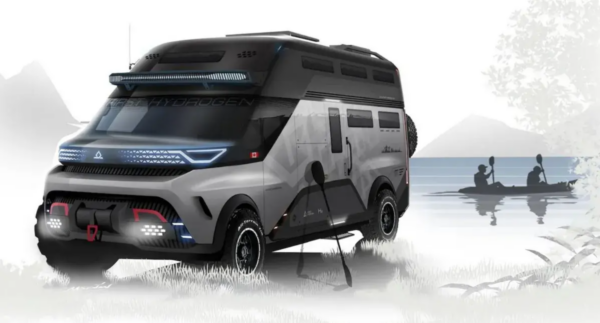First Hydrogen, a Canadian-British startup, unveiled a fuel cell-powered RV design. The RV idea, developed with German technical services provider EDAG Group, shows how First Hydrogen explores fuel cell electric technology for larger vehicles.
FCEVs for RVs can travel farther and carry more than BEVs.
RVs go long distances into wilderness areas without fuelling or charging infrastructure. Thus, the long-range potential is tempting, yet refueling an FCEV takes minutes, similar to fuelling a petrol or diesel vehicle.
Recharging electric vehicles takes hours, limiting van life freedom. FCEVs can run recreational vehicle auxiliary loads like ovens and water boilers.
Fuel cell powertrains emit less pollution and noise than ICEs. Like gas or diesel vehicles, FCEVs could drive farther, carry more, and refuel in minutes.
First Hydrogen has not released the anticipated range for its Gen 2 vehicle, although the first-generation van can go between 249 and 373 miles (400 and 600 kilometers) on a five-minute refueling.

First Hydrogen released photographs of their Gen 2 LCV concept, which has off-road illumination, a front winch, and a roof solar panel. The capacious cabin could fit a kayak and turn the vehicle into a comfortable camping site, even though there is no roof rack.
RVs have plenty of space.
The RV would have plenty of living space and good ground clearance, and First Hydrogen may investigate an all-wheel-drive electric motor architecture for the Gen 2 vehicle portfolio, suggesting an off-road camper van.
First Hydrogen is testing its Generation I fuel cell LCV with the UK Aggregated Hydrogen Freight Consortium (AHFC) and fleet management business Rivus. The company recently unveiled its Generation II LCV idea and is working on winch-equipped trucks with trailers or cargo boxes.
First Hydrogen Automotive CEO Steve Gill said the company shows LCV fuel cell technology’s potential. The company is investigating how the technology can benefit other industries, particularly leisure vehicles. Bernat Costa, Design Director at EDAG Spain, said the RV’s design follows the Generation II series’ clean, modern aesthetic that stresses utility and honors the van’s green fuel technology.
The North American recreational vehicle market was $56.29 billion in 2022 and expected to reach $107.6 billion by 2032. Despite global supply chain challenges, the European leisure sector saw record sales of 260,000 new vehicles in 2021 and healthy demand in 2022.
First Hydrogen believes hydrogen-powered vehicles may help this developing market reach zero emissions with the commercial vehicle sector.

